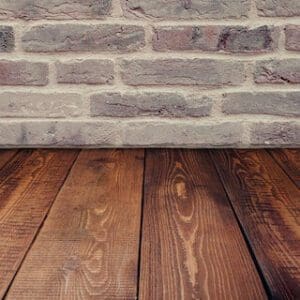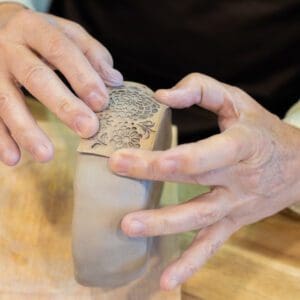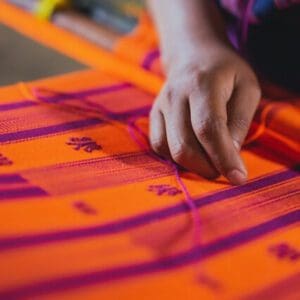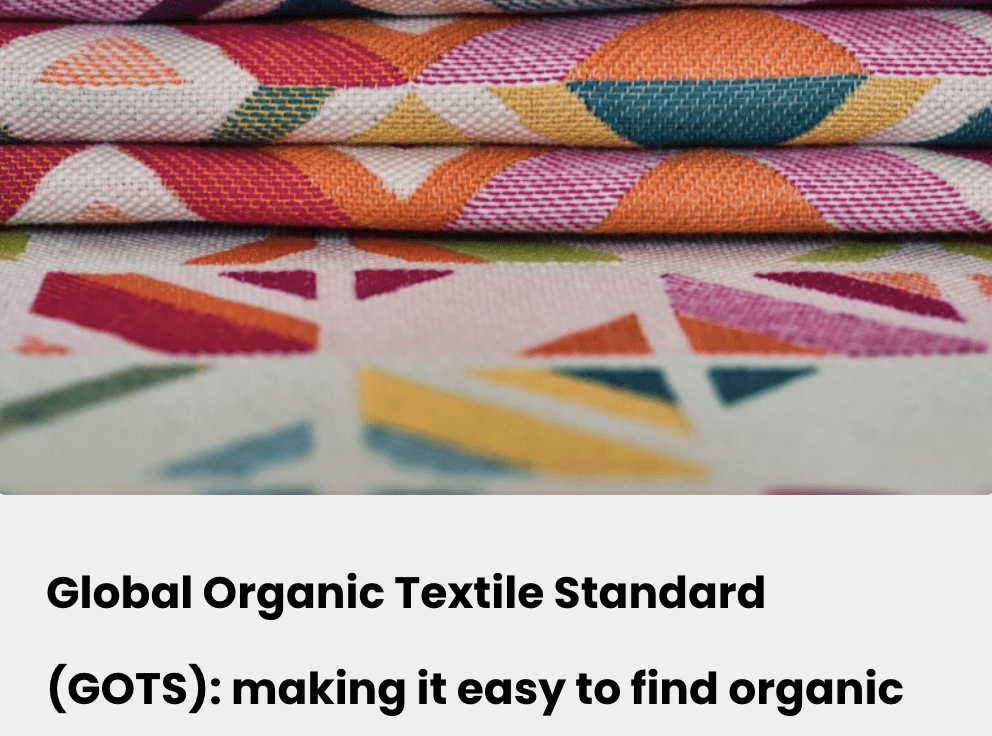In this post, we take a look at the role of Fair Trade certification in designing a home you can feel good about plus point you in the direction of some stores to check out who carry Fair Trade certified home goods.
The Home Green is reader-supported and may receive a commission if you decide to make a purchase through a posted link, at no cost to you.
When it comes to sustainability, protecting the environment is typically top of mind. While that is certainly a huge part of what it means to live a sustainable life, another important part is considering people. True sustainability should be creating a system in which all parts have the ability to operate successfully in the long run. If the people in this process are forced to work in a way that is impossible for them to maintain into the future, that is not truly sustainable.
With today’s complex supply chains, it can be difficult or potentially impossible for the average consumer to really understand the sustainability of what they bring into their home. That’s what makes sustainable certifications so powerful – they give shoppers confidence that what they are buying is safe, eco-friendly, or responsibly made. To understand if a company has treated its workers well, looking for information on whether a product is Fair Trade certified is one of your best bets.
What is Fair Trade?
Fair Trade certification is a designation that indicates that the workers involved in the production of a particular product have been equitably treated. It aims to promote ethical and sustainable trading practices, particularly in developing countries, by ensuring that producers are paid fair wages and work in safe conditions.
Key principles of Fair Trade certification typically include:
- Fair prices: Producers receive a price that covers the cost of sustainable production, taking into account environmental, social, and economic factors. This often includes a premium that goes directly back to the community for development projects.
- Fair labor conditions: Workers have safe and healthy working conditions. Child labor and forced labor are prohibited.
- Direct trade: Importers or buyers establish direct relationships with producers, cutting out unnecessary intermediaries and ensuring that producers receive a larger share of the final sale price.
- Responsible environmental practices: Producers are encouraged to adopt environmentally sustainable practices, such as organic farming, reduced chemical usage, and conservation of natural resources.
- Community development: A portion of the proceeds from Fair Trade sales are invested in community development projects, such as education, healthcare, infrastructure, and more.
- Transparency: The supply chain and production processes are transparent, allowing consumers to trace the origins of the product.
What Types of Products Can Be Fair Trade Certified?
Fair Trade certification can be applied to various products, spanning many industries. Some of the common products that can be Fair Trade certified include:
coffee & tea


Fair Trade coffee and tea producers pay their workers fair wages and offer safe working conditions, while also promoting environmental sustainability.
chocolate & cocoa


Fair Trade chocolate aims to address issues such as child labor and exploitation in the cocoa industry, while also supporting sustainable cocoa production.
fresh produce


Some fruits and vegetables, like avocados, citrus, and mangoes, can be Fair Trade certified to ensure fair wages and ethical farming.
wine


Fair Trade wine certification emphasizes fair labor practices in vineyards and supports community development.
grains and nuts


Fair Trade certification for grains, nuts, dried fruits, and other snacks helps ensure that farmers are paid equitably and that sustainable farming practices are followed.
clothing


Working conditions in the fashion industry continue to grab headlines and leave tremendous room for improvement. More Fair Trade certification would be a welcome change.
sugar


Fair Trade sugar certification supports small-scale farmers and ensures that they are paid equitably for their labor.
textiles


Fair Trade cotton promotes environmentally sustainable and socially responsible practices in the textile industry. involved.
honey


Honey Fair Trade certification emphasizes sustainable beekeeping practices and fair compensation for beekeepers.
spices


Some spice products, like vanilla, cinnamon, and herbs, can carry Fair Trade certification.
What Fair Trade certification logo should I be looking for?
One thing that is a bit confusing is that unlike many of the other 3rd party verifications related to sustainability, there is more than one organization devoted to Fair Trade certification. The two most prominent in the US seem to be Fair Trade USA™ and Fairtrade America.
Fairtrade America is the newer entrant to the market but is growing steadily, while Fair Trade USA™ does seem to be the more recognized mark in the United States at the moment. While both organizations have slightly different criteria and standards, with each, the overarching goal is to create a more equitable and sustainable trading system that benefits producers.
One difference between the two organizations is that Fair Trade USA™ allows US farms and farmers to participate in their programs while Fairtrade America is focused on developing nations. In addition, Fairtrade America lists that “50% of the voting members at our General Assembly are Fairtrade farmers and workers.”
What Does Fair Trade certification mean in interior design
In interior design, Fair Trade certification could apply to various elements, such as:
Flooring


Flooring materials like wood, bamboo, or cork could be Fair Trade certified if they are sourced and manufactured in a way that supports Fair Trade and sustainability.
Home Decor


Items like lamps, decorative accessories, and artwork could also carry Fair Trade certification, signifying that they were made under fair and sustainable conditions.
Furniture


Furniture made from sustainable materials using fair labor practices could be Fair Trade certified. This might involve using responsibly sourced wood, eco-friendly finishes, and ensuring that workers are paid fair wages.
Textiles


Textiles like carpets, rugs, curtains, and upholstery fabrics could be Fair Trade certified, indicating that they have been produced using ethical labor practices and environmentally friendly processes.
Why look for Fair Trade certification when shopping for your home?
Fair Trade may be more top of mind for rapid consumption items like coffee and tea but there is definitely reason to look for the Fair Trade mark when shopping for home goods. Issues that exist in the production of home goods include (but are sadly not limited to):
- Child labor in rug production – the use of child and slave labor in the production of rugs is a problem in products that have shown up in even mainstream retailers. Learning more about the production of rugs and carpets for your home means you can avoid supporting the abuse of people in desperate situations.
- Forced labor in flooring – there are a lot of reasons to look for solutions other than “luxury vinyl” flooring (which is actually plastic) and among them is the fact that studies show that some of these products are made in toxic conditions with forced labor.
- Textiles – The challenges in the textiles and cotton industries are numerous including the use of child labor and forced labor. Looking for Fair Trade items when buying woven goods, linens, and other textiles is a great practice.
Furniture – the use of forced labor in furniture production and raw material harvesting is a problem in the industry, particularly in goods coming from Belarus.
Furniture companies and home goods suppliers who sell Fair Trade certified products


William Sonoma and its sub-brands Pottery Barn, Pottery Barn Kids, Pottery Barn Teen, and West Elm all feature products that are certified by Fair Trade USA™.
Target has a number of categories that carry Fair Trade certification including coffee and food products. In the home category, they have bedding options that have been certified by Fair Trade USA™.
Hülyahome sells environmentally friendly home furnishings including bath towels and bed linens that are Fairtrade America certified as well as meeting standards for GOTS certification, FSC Certification, and the OEKO Tex Standard 100.
Looma specializes in thoughtfully created bedding, blankets, and throws. They specify that “each of our farms are certified as fairly and ethically run by Fairtrade America.”
Coyuchi sells bedding and bath products, and some clothing options, as well. They focus on product circularity and have a host of 3rd party endorsements to back up their environmental claims.
PACT: In addition to a great line of sustainable clothing for women and men, PACT also sells bedding and bath products that are listed as Fair Trade.
Other ideas for shopping Fair Trade
The use of Fair Trade certification in interior design is still fairly limited and it can feel constraining when shopping for your home. There are, however, other ways to feel confident that your home design choices aren’t exploiting others.
- Buy directly from the maker – one surefire way to make sure that the person who made an item is fairly treated is to purchase it directly from them! Seek out the craftspeople close to you and see if they might have just what you are looking for.
- Etsy – In the event that there isn’t a supply of talented artisans in my immediate vicinity, check out one of our favorite sources: Etsy. Many of the shops are posted by the makers themselves so you can feel more confident that you’re not supporting exploitation. Etsy vendors sell new and used items for your home.
- Buy secondhand – Finding something vintage is always a good way to avoid supporting unfair or unsafe working conditions. Look in local thrift and antique shops or online. (See Etsy, above)
- Dig a little deeper – there’s that old saying, “If it seems to be too good to be true, it probably is.” Buying cheap home goods and furniture may seem great at first, but there’s usually a cost somewhere: to the item’s longevity, to the planet your kids will live on, to another human, or to the toxicity of your home. Consider the total cost of an item before you bring it home.
- Look for vendors who share their labor practices – I would give this classification a yellow, proceed with caution rating. There are many manufacturers and resellers who don’t have Fair Trade certification for perfectly valid reasons so it’s always great to learn more about a company’s standards and practices. The cautionary part of this recommendation is to be on the lookout for greenwashing and do what you can to verify that a company has good intentions with its labor policies.
Some things to look out for when shopping Fair Trade
Sadly, there are some ways in which the term “Fair Trade” can be misused. A few of these ways include:
- Lack of certification: Some companies might claim their products are “Fair Trade” without obtaining proper certification from recognized Fair Trade organizations. True Fair Trade products are certified by established certifying bodies based on specific standards.
- Vague claims: Businesses might use the term “Fair Trade” without providing specific information about how their products meet Fair Trade principles. This lack of transparency can make it difficult to determine the authenticity of a Fair Trade claim.
- Misleading labels: Labels that closely resemble authentic Fair Trade certification logos might be used on products that haven't gone through the proper certification process.
- Greenwashing: Some companies might use the term “Fair Trade” alongside other environmental claims to create a perception of ethical and sustainable practices, even if their practices don’t align with genuine fair trade principles.
- Limited commitment: A company might sell one or a few products labeled as “Fair Trade,” but the majority of their product offerings are not certified or don’t meet Fair Trade standards.
To ensure that you are supporting genuine Fair Trade practices, here are some steps you can take:
- Look for products with certifications from recognized Fair Trade organizations, such as Fair Trade USA or Fairtrade America.
- Research the company's commitment to Fair Trade principles, its supply chain transparency, and its track record in ethical sourcing.
- Read product labels carefully and check for additional information on the company's website or packaging about their Fair Trade practices.
- Support brands that have a longstanding history in Fair Trade and have a transparent approach to certification.
Being an informed consumer and supporting brands that genuinely prioritize Fair Trade practices can help promote the true goals of Fair Trade, including livable wages, ethical labor practices, and sustainable production.
Other articles you may enjoy
Free tips and inspiration in your inbox
Enter your email address below to receive the latest news from The Home Green.




